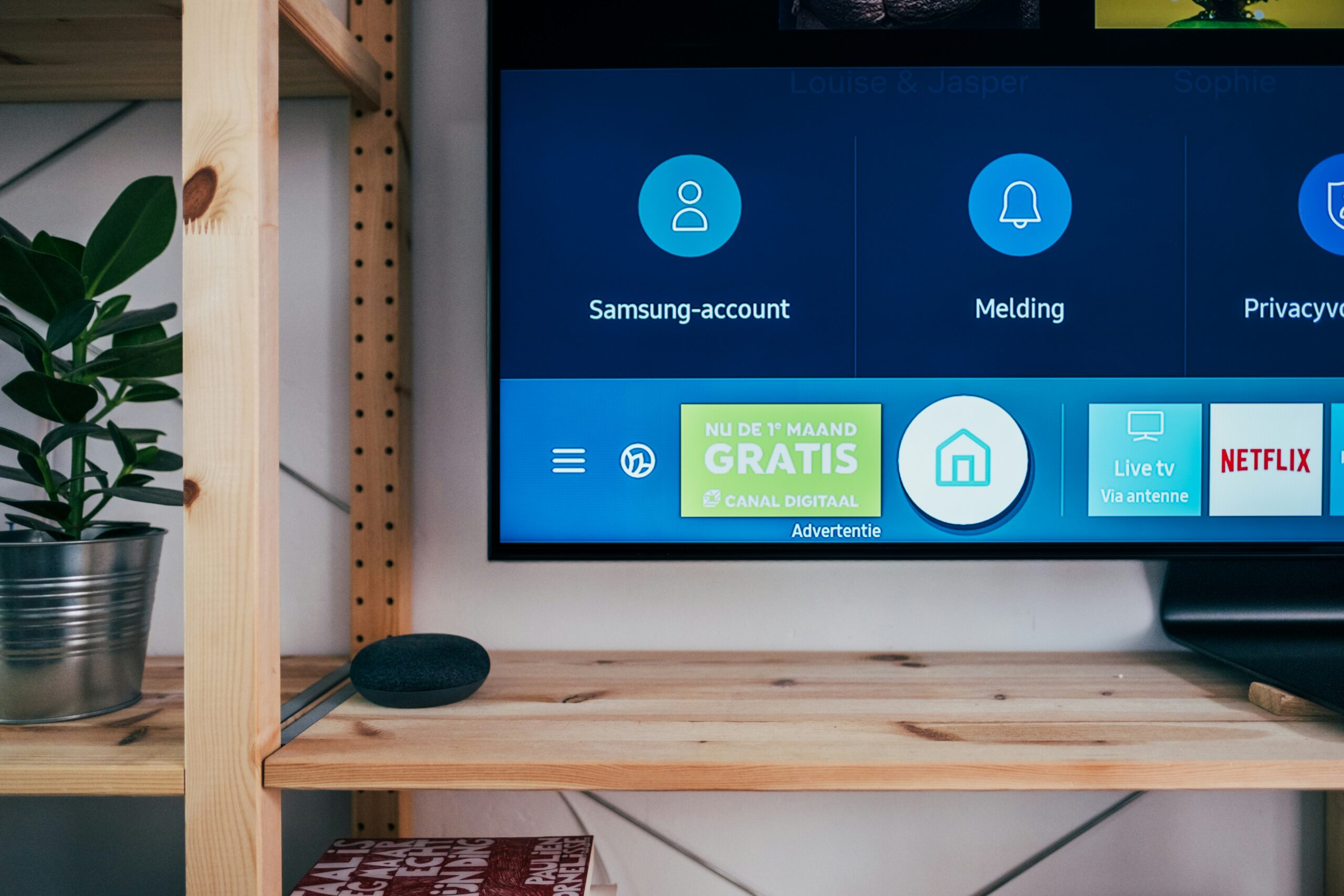
The Weekly Habit That’s Helped Me Launch My Business and Travel Through 53 Countries
One of my favorite quotes is from Albert Einstein: “Compound interest is the eighth wonder of the world. He who understands it, earns it … he who doesn’t … pays it.”
You’re probably thinking this refers to finance, but the same principle applies to your day-to-day life. A burst of motivation for a few weeks feels great, but the more important changes happen over years or decades. You can either win with these slow, steady changes (if you have a system for implementing them), or you lose (if you’re making inconsistent bursts of progress but everyone else is slowly, but steadily, passing you by).
I spent years reading personal development books and blogs. (So so many books…) Setting goals, trying to improve my life, and generally thinking I was making progress. I was getting tasks done, but the life I really wanted seemed far away, and I didn’t know when I’d get there.
I’d set annual goals (that I sometimes met), tried new systems for a few weeks or months, and started habits that fell apart when I went on holiday, started a new job, or changed goals.
I was making one-off “bursts” of progress, rather than the continual, compounding progress that I knew I needed for sustained change.
So, I made a shift in my system and started incorporating my weekly review.
The weekly review (aka “The Rich Life Operating System”)
I’ve been reviewing my life weekly for the last eight-ish years. The weekly review serves as my “operating system” to implement personal development initiatives, make sure I progress on projects, and appreciate my life. Here’s how it works:
- Every week I sit down with a coffee and think about what happened last week.
- I write down things I’m happy about, where I think I can improve in any aspect of my life.
- And I make sure I’m making steady progress in the areas of life that are important to me.
It’s simple. But most useful things are.
It looks like this:
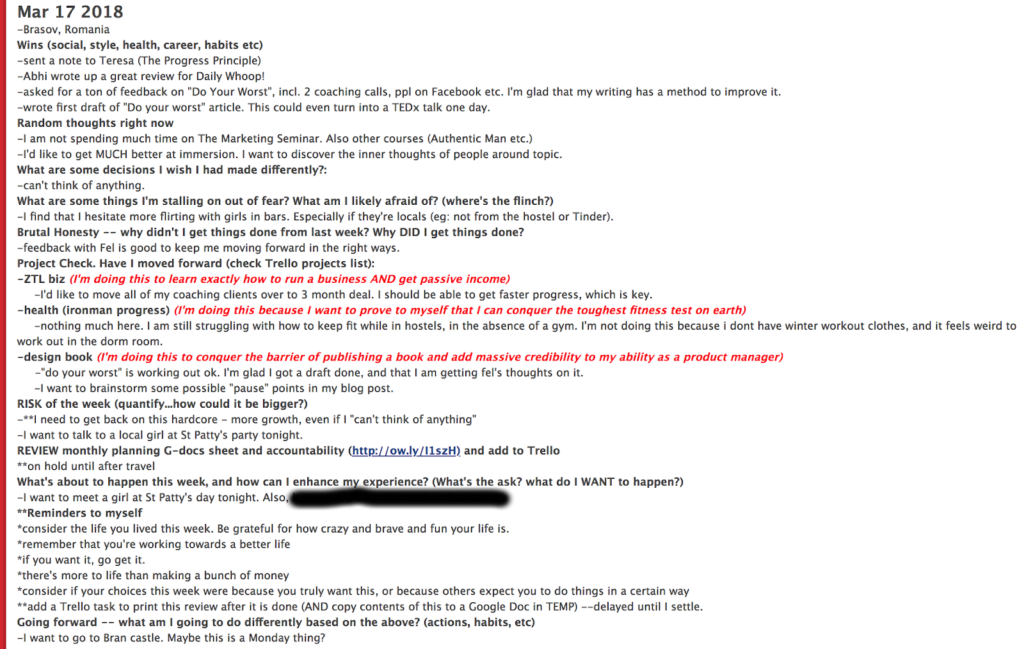
This all goes in an online journal (I use PBWorks), which makes it hard to lose, searchable, and easy to do while traveling. I expect I’ll be able to do it for the rest of my life. (You can download a simple Google Docs template here.)
When I started doing this myself, it didn’t seem to be making much of a difference (after all, it feels much better to be inspired by a blog post or TED Talk and hustle over the short term), but looking back on the last eight years, the difference in my life is shocking.
I’ve been able to:
- Launch an online business (starting from complete scratch)
- Travel to 53 countries (see the lead image of this post for proof!)
- Teach myself how to make Android apps and a balloon dog
- Start a podcast
- Run a marathon (after two failed attempts)
- Start a TEDx event
- Become a qualified professional engineer
- Move to the UK (from Canada)
- Qualify for MENSA
Surprisingly, I STILL feel pretty lazy compared to most people that are “hustling.” But just like compound interest, you don’t need massive bursts of progress if you’re making a little progress very regularly.
Here are some things I’ve learned about keeping this system going.
Make it easy to do for the next 20 years
Most habits fail because they’re too inflexible. Don’t make the mistake of creating an overly rigid system that relies on you answering a list of 10 perfectly optimized questions. Start simple, only add complexity after several months if you really want to.
When I started my weekly review, I used to ask very specific questions (“what did I learn this week?”) that sometimes didn’t have really great answers.
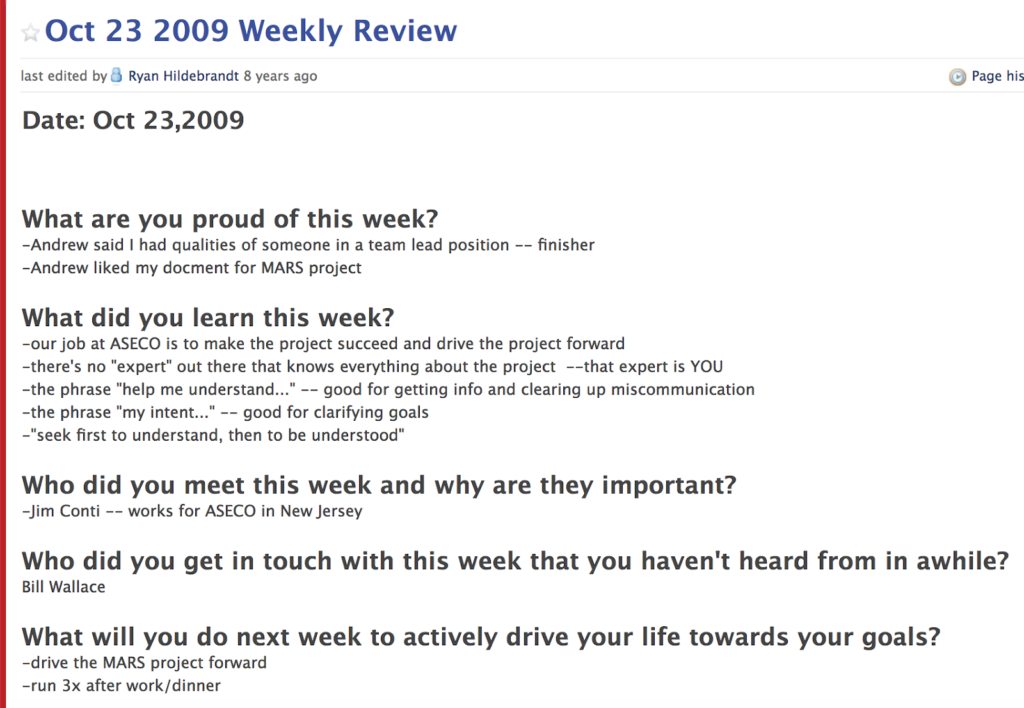
After a year, I shifted to a more general format that worked a TON better because it was easy to write things down.

My review is now centered around two themes/questions:
- What were some highlights last week?
- What do I want to do next week to ensure more of these?
Both of these always have an answer even if I’m on holiday, change jobs, or get really busy (e.g., they are better than “was I grateful this week?”, “did I go for a run three times this week?”, or “what new person should I reach out to?”, all of which I’ve tried and quickly eliminated), and have been central to my review for the last five years. Other questions have changed, but these have always stayed the same.
This is the imperfect system that I can actually do for a long time.
Here are some questions I suggest you start with:
- What were some highlights last week? (“called my sister,” “pitched Sean an article for IWT,” “one of my readers landed a TEDx talk”)
- What do I want to do next week to improve my life? (“make a list of people to pitch guest posts to,” “negotiate bank fee,” “book a trip to Spain”)
- What am I afraid of right now? (“I’m a bit nervous to raise the price of my course right now, because I don’t want my subscribers to think I’m greedy or out of touch with my true value”)
- What do I wish I would have done differently? (“I didn’t go to the gym at all last week”)
- Check in with your current projects – what progress did you make this week?
- Any affirmations you want to remind yourself of (optional)
If mine don’t resonate, what’s important is that your prompts:
- Are easy to answer (“wins for the week” is easier to answer than reflecting on various categories of your life, like “how did I get better at parenting this week?” It’s also more motivating to have a big list of wins than to leave some of the categories blank)
- Reinforce positive behavior (“did you hustle every day this week?” can be demotivating vs “what did you win at?”, which always has a positive answer)
- Have different answers every week (e.g., “what are you grateful for?” can easily be the same every week of your life, but your wins of the week are also things you can be grateful for, but these things are in your control)
- Are goal-agnostic (“did you pitch three guest posts?” might be good for now, but in five years you’ll likely have different goals)
- Are flexible — I change my questions every few months or years whenever I see the value of reflecting on something new (e.g., “what am I afraid to do?” is a new addition)
Remember, this isn’t a replacement for other habits and systems (i.e., a to-do list, a health/fitness habit, your business tasks, etc.), but rather, the underlying system that can transcend all of it. It’s the operating system, not the app.
You should be able to easily keep this same habit up for the next 20 years. That means it can’t be based on a specific life goal, city you live in, business, or career. It should be insanely easy and flexible.
Ready to improve your habits and level up your life? Download our FREE Ultimate Guide To Habits below.
Write it down
What are some of your highlights from 2014? Chances are, you spent a ton of time on personal development efforts and made real progress in your life, but do you remember any of it?
A written weekly review makes it simple to remember how you’ve moved forward in your life, and looking back on these insights is a ton of fun. I do that each year in a yearly review for easy referencing:
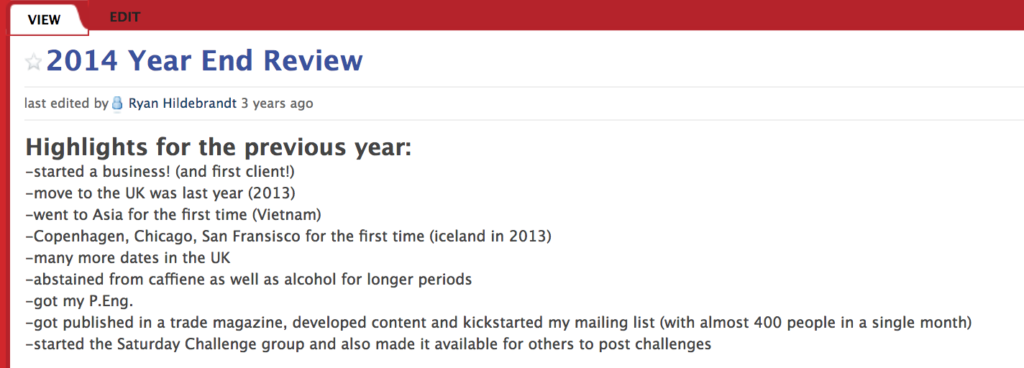
This ability to review the victories of the past not only makes you appreciate how far you’ve come, remembering these victories helps form the habit of always moving forward.
I write down wins from the day as I notice them (I made an app so I can be reminded to do this and track wins whenever I have my phone with me, but you can use a notebook or piece of paper), roll these up into a written review for the week (on PBWorks, but you can use Google Docs, Evernote, or whatever tool you like), and summarize highlights for the year (also in PBWorks).
Use an email reminder (not a notification)
I use a recurring calendar event with an email reminder. Emails are harder to dismiss than a notification.
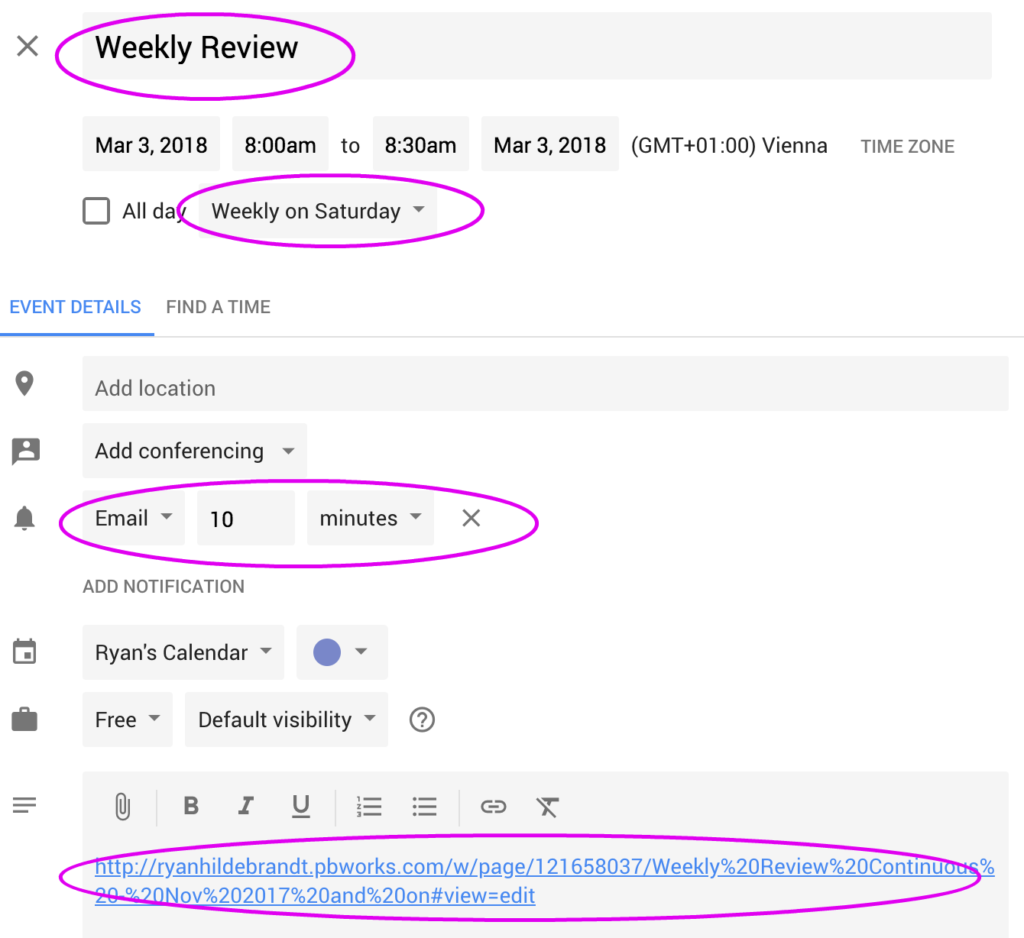
At least half the time my review doesn’t happen on Saturday, and certainly not at the same time, but I’m more concerned with consistency than with maintaining a set schedule.
The email reminder ensures whenever I look at my inbox, I’m reminded that I still haven’t done my review for the week.
If it happens on Tuesday and not Saturday? Great. Still happened. Flexibility (not rigidity) is the key for consistency. If you have the choice between stopping this habit and making it easy on yourself, choose to make it easy on yourself.
Celebrate as much as you can
This week I’m happy about three new Tinder matches, buying some fresh roasted coffee, trying a co-working space for the first time, and sending an email reaching out to an influencer in my industry.
Get in the habit of celebrating anything you possibly can.
By noticing every tiny victory you have, you train your brain to recognize opportunities to create more of them. Victory isn’t just a positive result, it’s positive action. Noticing and celebrating these things is the key to developing the habit of creating more of them over the long term.
What have you done this week that you’re proud of? At first, calling your mom, having one less sugar in your coffee, spending 20 minutes reading a business book, or publishing one blog post doesn’t seem significant, but they’re all worth identifying and celebrating.
What about now, this very moment? No matter how far along your career or business is, where you are in the world, or what you’re planning to have for dinner, there are tiny steps you can take to make your life richer. Alone, they’re insignificant steps in an insignificant day, but as part of a regular weekly review habit, they can add up to something huge. I’ve seen it happen firsthand.
The Rich Life you want doesn’t have to involve a ton of “hustle” if you’re willing to make tiny, consistent changes. It doesn’t have to be years or decades away, you can start creating it today.
Stuck for ideas? I’ve got a suggestion — start your own weekly review.
I put an email series together to help get you started. You can sign up here.
Did you start your own weekly review? I’d love to hear from you (and I’ll celebrate this for my own review)
Like this blog post? Learn how to create amazing content like this that attracts and engages your target buyers with our FREE Ultimate Guide To Remarkable Content.
Written by Ramit Sethi
Host of Netflix's "How to Get Rich", NYT Bestselling Author & host of the hit I Will Teach You To Be Rich Podcast. For over 20 years, Ramit has been sharing proven strategies to help people like you take control of their money and live a Rich Life.
